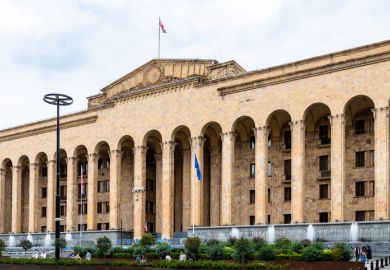Source: Getty
Bridging the wall: positions on an academic boycott of Israel are often entrenched, and although much of the debate was civil, there were some knee-jerk ‘what-about’ moments
Academic conferences looking at Israel/Palestine are always going to be contentious. And so it proved with the three-day event on Boycotts – Past and Present, hosted by the Pears Institute for the Study of AntiSemitism at Birkbeck, University of London, in late June.
The plan was to present papers on subjects going all the way back to the American War of Independence and then to slowly home in, via the anti-apartheid movement, on today’s boycott, divestment and sanctions (BDS) campaign against Israel. And true to form, as the institute’s director, David Feldman, noted cheerfully in an introductory speech, the conference had already been dismissed on the web both as “an exercise in hasbara – Israeli propaganda” and as “a form of academic ‘treachery’ against Israel”.
He went on to lay out some of the most sensitive areas. There are fierce disputes about whether boycotts are effective, have a genuine economic impact, act as a tool for mobilising support or are largely symbolic (and perhaps even an exercise in self-righteous grandstanding). Even more vehement are the arguments about Israeli policies and whether or not there are legitimate parallels with apartheid South Africa.
And then there is what Professor Feldman called “what-aboutery”. This argument, which has a long history, once went as follows: “If it is right to boycott the sugar produced on slave plantations, what about the factory slaves?” The current version tends to be: “Even if Israel deserves to be condemned, what about China? What about Burma? What about Saudi Arabia? Why aren’t they being boycotted, too?”
But although he acknowledged an “understandable tendency for debate on BDS to generate more heat than light”, Professor Feldman hoped that bringing together from across the world experts on discrimination law, popular protest movements, anti-Jewish boycotts, nationalist boycotts, bus boycotts and even boycotts of lettuce and powdered milk could help to clarify the issues and touch on some highly emotive questions without degenerating into a slanging match.
Yet academics are very much interested parties in this area, not least because the academic boycott is a central element of the BDS campaign, and one with huge symbolic importance.
Looking at the struggle against apartheid, Saul Dubow, professor of African history at Queen Mary, University of London, pointed to the huge propaganda impact of sporting boycotts. “The real hurt to South Africa came with the Stop the Tour campaigns of 1969 and 1970, which targeted international cricket and rugby tests – a body blow to white South African masculine pride.”
Given “the significance of Israeli universities as global producers of academic knowledge”, argued Derek Penslar, Stanley Lewis professor of Israel studies at the University of Oxford, today’s academic boycott made an interesting parallel.
“In terms of visibility and desired effect,” he suggested, “universities are to BDS what athletic teams were to the anti-apartheid movement…Opponents of BDS try to argue against the boycott by pointing to the indispensable role of medical and communications technology that have been developed at Israeli universities. Yet it is precisely Israel’s prominence in knowledge-rich industry that makes its universities such visible targets for a boycott.”
Many of the academic speakers at the conference were also activists, veterans of the anti-apartheid movement, keen supporters or keen critics of the BDS campaign. Several gave sympathetic accounts of how it had developed.
John Chalcraft, reader in the history and politics of empire/imperialism at the London School of Economics, compared the BDS campaign with the “horizontalism” of the recent Occupy movement and popular protests in Latin America. All were “transgressive mobilising collective projects” based on direct action and “rhizomic networks”, which could be interpreted as either “leaderless” or “leaderful”. BDS, he concluded, amounted to “horizontalism on steroids”.
Philip Marfleet, professor of migration and refugee studies at the University of East London, claimed that “the BDS movement developed its momentum over the past 10 years in the context of a global movement for social justice”. It could not be attributed, he continued, to “growing anti-Jewish feeling” and was now no longer “confined to the usual suspects on the radical Left”.

Others tried to dissect the errors and prejudices of both “sides”. Sina Arnold, a PhD student at the Technical University of Berlin, analysed the different conceptual “frames” used by BDS activists and critics, which inevitably led to “political gridlock”. Both might talk about human rights and academic freedom, yet “BDS advocates perceive a strong right-wing or Zionist influence on campus”, while BDS opponents see “a structural liberal dominance”. Instead of “focusing on the actual arguments”, Ms Arnold suggested, many fell back far too easily on either “psychologising the other side” or “seeing the arguments as mere camouflage for hidden anti-Semitic or right-wing agendas”.
The conference included a joker in the pack, a self-confessed “geriatric hippy” – Oliver Leaman, professor of philosophy at the University of Kentucky – who looked back to the days of the Vietnam War and suggested that popular protest movements such as boycotts are “an enormous amount of fun, with lots of parties and opportunities for meeting people”. Moral consistency and “what-aboutery” should not stop people from choosing which injustices they wish to campaign against because motivation is never the crucial issue. “Giving money to a charity worker who is attractive doesn’t mean it’s a bad thing to do,” he argued.
And the brickbats…?
The scholarly format and the variety of perspectives produced a lively and informative conference, but did it manage to prevent the deep underlying animosities breaking to the surface?
There were no fisticuffs, but sparks occasionally flew. Kenneth Marcus, president and general counsel of the Louis D. Brandeis Center for Human Rights under Law in Washington DC, set out a legal argument that certain kinds of anti-Israeli activism might “create a hostile environment for Jewish Americans, particularly on university campuses” under the 1964 Civil Rights Act. Just as hardcore pornography (which may be widely tolerated and permitted as a freedom of expression) could be banned in the workplace or on campuses because it creates a “hostile environment” for women, might not the same apply to the atmosphere created for Jews by “anti-Zionist propaganda”?
Such “worries about what Jews suffer on American campuses” were instantly savaged as “pure self-indulgence” by Dr Chalcraft, in a “what-about” response citing the suffering of Palestinians. Aleksandra Gliszczyńska-Grabias, an assistant professor at the Poznań Human Rights Centre at the Polish Academy of Sciences, was also slapped down for a brief mention of how Oxford professor Andrew Wilkie had refused to accept as a PhD student someone who had served in the Israeli army.
A question from the floor focused on Israeli security concerns, Arab rhetoric of “driving Jews into the sea” and what an Arab-majority state might mean for Israeli women.
Another asked if support for BDS implied support for a one-state solution in Israel/Palestine, “which means imposing on 12 million people something no one wants”.
Jeremy Krikler, reader in history at the University of Essex, thought that the failure of the BDS movement “to address the question of ‘When will the boycott be called off?’ ” made it more difficult for the Israeli Left to call for reform – and also enabled others to dismiss it as “just anti-Semitic”.
Concluding the day, Professor Penslar also called attention to the “lack of clarity” of the BDS campaign, “whose decentralised, non-hierarchical and ‘rhizomatic’ qualities were so rhapsodically described earlier today”.
Israel/Palestine, he went on, “attracts so much attention and generates so much passion among proponents of BDS because the conflict appears to involve one clearly culpable and one clearly aggrieved party, with the former perceived as having the capacity to affect change”.
But Professor Penslar added: “Although BDS is unlikely to bring about substantive political change in Israel and Palestine, in the future the movement’s support may well increase, and not merely because of injustices perpetrated in the occupied territories. Technological change, which facilitates virtual political activity, and paralysis in the face of political collapse elsewhere in the Middle East are important factors.”
Register to continue
Why register?
- Registration is free and only takes a moment
- Once registered, you can read 3 articles a month
- Sign up for our newsletter
Subscribe
Or subscribe for unlimited access to:
- Unlimited access to news, views, insights & reviews
- Digital editions
- Digital access to THE’s university and college rankings analysis
Already registered or a current subscriber?




